英语语法--连词
- 格式:doc
- 大小:74.00 KB
- 文档页数:14
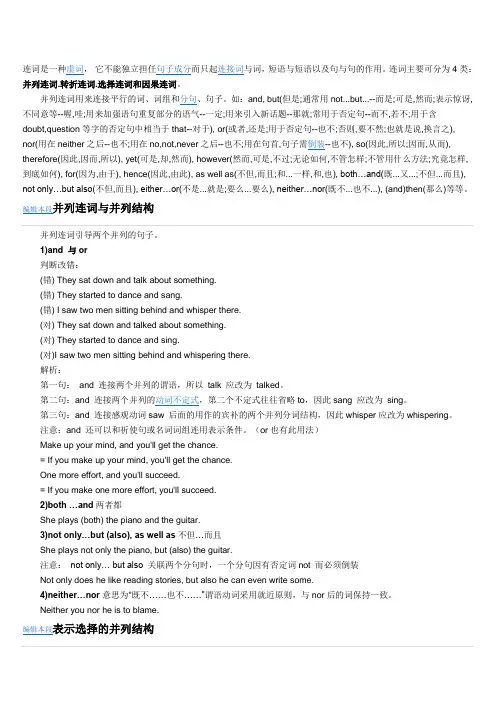
连词是一种虚词,它不能独立担任句子成分而只起连接词与词,短语与短语以及句与句的作用。
连词主要可分为4类:并列连词.转折连词.选择连词和因果连词。
并列连词用来连接平行的词、词组和分句、句子。
如:and, but(但是;通常用not...but...--而是;可是,然而;表示惊讶,不同意等--喔,哇;用来加强语句重复部分的语气--一定;用来引入新话题--那就;常用于否定句--而不,若不;用于含doubt,question等字的否定句中相当于that--对于), or(或者,还是;用于否定句--也不;否则,要不然;也就是说,换言之),nor(用在neither之后--也不;用在no,not,never之后--也不;用在句首,句子需倒装--也不), so(因此,所以;因而,从而), therefore(因此,因而,所以), yet(可是,却,然而), however(然而,可是,不过;无论如何,不管怎样;不管用什么方法;究竟怎样,到底如何), for(因为,由于), hence(因此,由此), as well as(不但,而且;和...一样,和,也), both…and(既...又...;不但...而且), not only…but also(不但,而且), either…or(不是...就是;要么...要么), neither…nor(既不...也不...), (and)then(那么)等等。
编辑本段并列连词与并列结构并列连词引导两个并列的句子。
1)and 与or判断改错:(错) They sat down and talk about something.(错) They started to dance and sang.(错) I saw two men sitting behind and whisper there.(对) They sat down and talked about something.(对) They started to dance and sing.(对)I saw two men sitting behind and whispering there.解析:第一句:and 连接两个并列的谓语,所以talk 应改为talked。
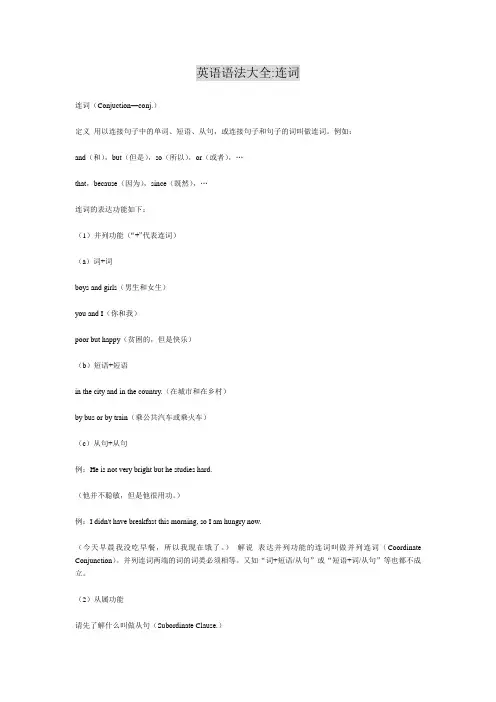
英语语法大全:连词连词(Conjuction—conj.)定义用以连接句子中的单词、短语、从句,或连接句子和句子的词叫做连词。
例如:and(和),but(但是),so(所以),or(或者),…that,because(因为),since(既然),…连词的表达功能如下:(1)并列功能(“+”代表连词)(a)词+词boys and girls(男生和女生)you and I(你和我)poor but happy(贫困的,但是快乐)(b)短语+短语in the city and in the country.(在城市和在乡村)by bus or by train(乘公共汽车或乘火车)(c)从句+从句例:He is not very bright but he studies hard.(他并不聪敏,但是他很用功。
)例:I didn't have breakfast this morning, so I am hungry now.(今天早晨我没吃早餐,所以我现在饿了。
)解说表达并列功能的连词叫做并列连词(Coordinate Conjunction)。
并列连词两端的词的词类必须相等。
又如“词+短语/从句”或“短语+词/从句”等也都不成立。
(2)从属功能请先了解什么叫做从句(Subordinate Clause.)本身不能独立表达完整的意思而只在句子中作句子结构的一部分者叫做从句。
用以连接从句使其在主句中发挥表达功能的词叫做从属连词(Subordinate Conjunction)。
as,when,since,that,who,which,what,…例:I know that he is a very good student.(我知道他是一个很好的学生。
—“that…”是名词从句作“know”的直接宾语。
)例:People who use free time well are usually healthy and happy.(善于利用空闲时间的人通常都是又健康又快乐。
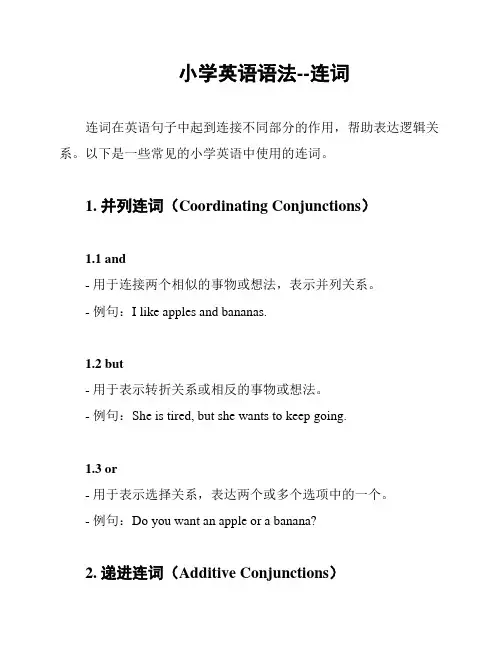
小学英语语法--连词连词在英语句子中起到连接不同部分的作用,帮助表达逻辑关系。
以下是一些常见的小学英语中使用的连词。
1. 并列连词(Coordinating Conjunctions)1.1 and- 用于连接两个相似的事物或想法,表示并列关系。
- 例句:I like apples and bananas.1.2 but- 用于表示转折关系或相反的事物或想法。
- 例句:She is tired, but she wants to keep going.1.3 or- 用于表示选择关系,表达两个或多个选项中的一个。
- 例句:Do you want an apple or a banana?2. 递进连词(Additive Conjunctions)2.1 also- 用于添加类似的事物或想法。
- 例句:She speaks English, and she also speaks French.2.2 furthermore- 用于提供更多信息或进一步解释。
- 例句:He is good at math. Furthermore, he excels in science.3. 转折连词(Concessive Conjunctions)3.1 although- 用于表示尽管某个条件存在,但结果与之相反。
- 例句:Although it was raining, we still went outside.3.2 however- 用于表示对前面说法的转折或相反观点。
- 例句:I wanted to go to the concert; however, I couldn't find tickets.4. 原因连词(Causal Conjunctions)4.1 because- 用于表示原因或解释。
- 例句:He couldn't go to the party because he was sick.4.2 so- 用于表达前因后果的关系。
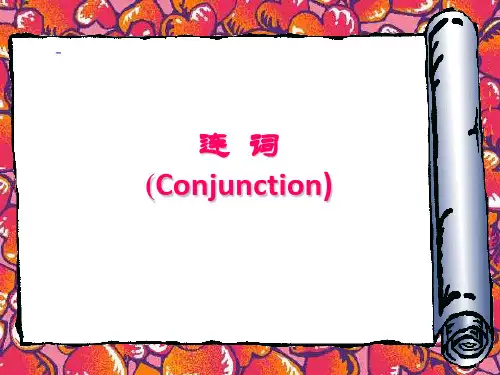
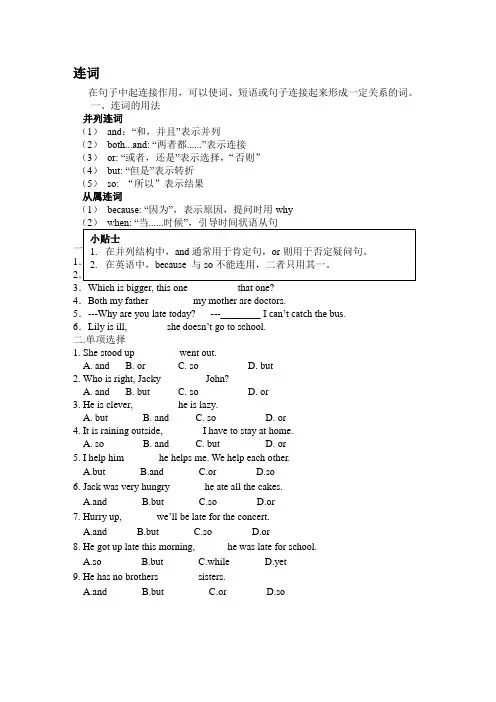
连词在句子中起连接作用,可以使词、短语或句子连接起来形成一定关系的词。
一、连词的用法并列连词(1)and:“和,并且”表示并列(2)both...and: “两者都......”表示连接(3)or: “或者,还是”表示选择,“否则”(4)but: “但是”表示转折(5)so: “所以”表示结果从属连词(1)because: “因为”,表示原因,提问时用why123.Which is bigger, this one _________ that one?4.Both my father ________ my mother are doctors.5.---Why are you late today? ---________ I can’t catch the bus.6.Lily is ill, _______ she doesn’t go to school.二.单项选择1. She stood up ________ went out.A. andB. orC. soD. but2. Who is right, Jacky ________ John?A. andB. butC. soD. or3. He is clever, ________ he is lazy.A. butB. andC. soD. or4. It is raining outside, _______ I have to stay at home.A. soB. andC. butD. or5. I help him ______ he helps me. We help each other.A.butB.andC.orD.so6. Jack was very hungry ______ he ate all the cakes.A.andB.butC.soD.or7. Hurry up, ______ we’ll be late for the concert.A.andB.butC.soD.or8. He got up late this morning, ______he was late for school.A.soB.butC.whileD.yet9. He has no brothers _______ sisters.A.andB.butC.orD.so。
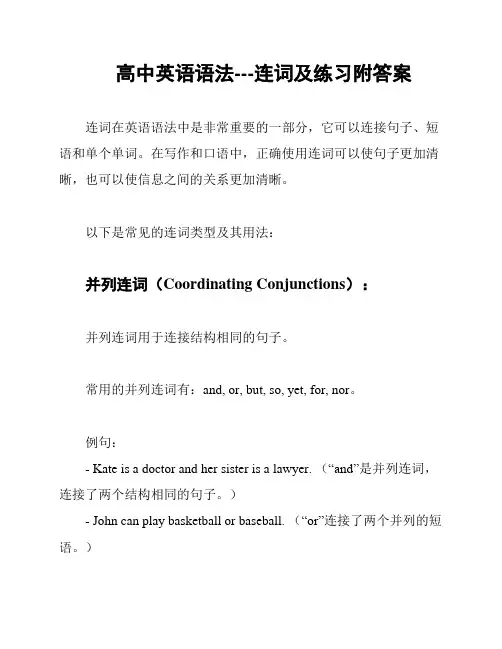
高中英语语法---连词及练习附答案连词在英语语法中是非常重要的一部分,它可以连接句子、短语和单个单词。
在写作和口语中,正确使用连词可以使句子更加清晰,也可以使信息之间的关系更加清晰。
以下是常见的连词类型及其用法:并列连词(Coordinating Conjunctions):并列连词用于连接结构相同的句子。
常用的并列连词有:and, or, but, so, yet, for, nor。
例句:- Kate is a doctor and her sister is a lawyer. (“and”是并列连词,连接了两个结构相同的句子。
)- John can play basketball or baseball. (“or”连接了两个并列的短语。
)从属连词(Subordinating Conjunctions):从属连词用于连接主句和从句。
从句可以是名词从句、形容词从句或副词从句。
常用的从属连词有:because, if, when, although, since, until。
例句:- I need to go to bed early because I have an important exam tomorrow. (“because”引导的是一个原因从句。
)连接副词(Conjunctive Adverbs):连接副词用于连接两个句子或短语,以表示它们之间的关系。
连接副词通常出现在句子的两个主句之间。
常用的连接副词有:however, therefore, moreover, nevertheless, consequently, etc.例句:- Jane likes to swim. However, she doesn't like to dive. (“however”连接两个句子,表示转折关系。
)- Tom is a good student. Therefore, he always gets good grades. (“therefore”连接两个句子,表示因果关系。
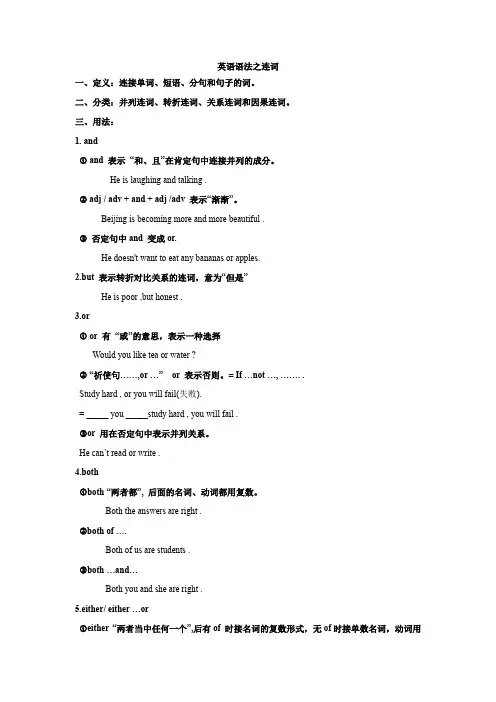
英语语法之连词一、定义:连接单词、短语、分句和句子的词。
二、分类:并列连词、转折连词、关系连词和因果连词。
三、用法:1. and① and 表示“和、且”在肯定句中连接并列的成分。
He is laughing and talking .② adj / adv + and + adj /adv 表示“渐渐”。
Beijing is becoming more and more beautiful .③否定句中and 变成or.He doesn't want to eat any bananas or apples.2.but 表示转折对比关系的连词,意为“但是”He is poor ,but honest .3.or① or 有“或”的意思,表示一种选择Would you like tea or water ?② “祈使句……,or …” or 表示否则。
= If …not …, ……. .Study hard , or you will fail(失败).= _____ you _____study hard , you will fail .③or 用在否定句中表示并列关系。
He can’t read or write .4.both①both “两者都”, 后面的名词、动词都用复数。
Both the answers are right .②both of ….Both of us are students .③both …and…Both you and she are right .5.either/ either …or①either “两者当中任何一个”,后有of 时接名词的复数形式,无of时接单数名词,动词用单数形式。
You may wear either of the hats.②either …or… “不是……就是……,或者……或者…….”动词与临近的主语保持一致。
即“就近原则”.Either you or he has to go = Either he or you have to go .6.neither /neither …nor…①neither “两者当中都不”,后有of 时接名词的复数形式,无of时接单数名词,动词用单数形式。
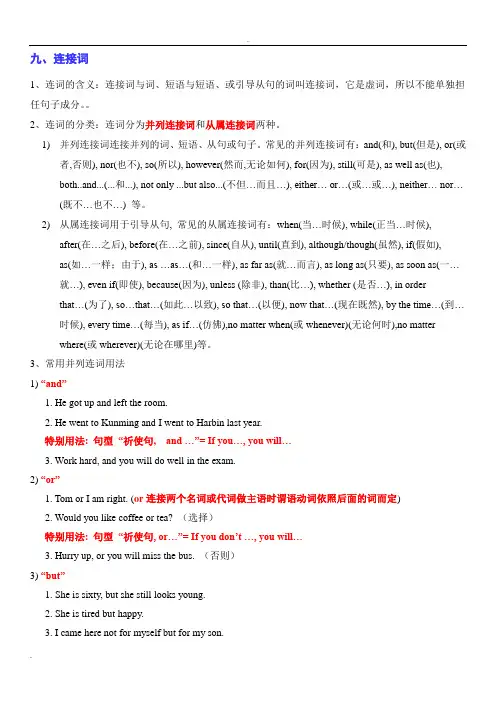
九、连接词1、连词的含义:连接词与词、短语与短语、或引导从句的词叫连接词,它是虚词,所以不能单独担任句子成分。
2、连词的分类:连词分为并列连接词和从属连接词两种。
1)并列连接词连接并列的词、短语、从句或句子。
常见的并列连接词有:and(和), but(但是), or(或者,否则), nor(也不), so(所以), however(然而,无论如何), for(因为), still(可是), as well as(也),both..and...(...和...), not only ...but also...(不但…而且…), either… or…(或…或…), neither… nor…(既不…也不…) 等。
2)从属连接词用于引导从句, 常见的从属连接词有:when(当…时候), while(正当…时候),after(在…之后), before(在…之前), since(自从), until(直到), although/though(虽然), if(假如),as(如…一样;由于), as …as…(和…一样), as far as(就…而言), as long as(只要), as soon as(一…就…), even if(即使), because(因为), unless (除非), than(比…), whether (是否…), in orderthat…(为了), so…that…(如此…以致), so that…(以便), now that…(现在既然), by the time…(到…时候), every time…(每当), as if…(仿佛),no matter when(或whenever)(无论何时),no matterwhere(或wherever)(无论在哪里)等。
3、常用并列连词用法1) “and”1. He got up and left the room.2. He went to Kunming and I went to Harbin last year.特别用法: 句型“祈使句, and …”= If you…, you will…3. Work hard, and you will do well in the exam.2)“or”1. Tom or I am right. (or连接两个名词或代词做主语时谓语动词依照后面的词而定)2. Would you like coffee or tea? (选择)特别用法: 句型“祈使句, or…”= If you don’t …, you will…3. Hurry up, or you will miss the bus. (否则)3)“but”1. She is sixty, but she still looks young.2. She is tired but happy.3. I came here not for myself but for my son.4. Mary likes piano but Tom doesn’t (like可以省略).4)“for”1. I went to sleep soon, for I was very tired.2. The sun has risen,for the birds are singing.比较:表示原因, 译为”因为”, 表示说明、解释。
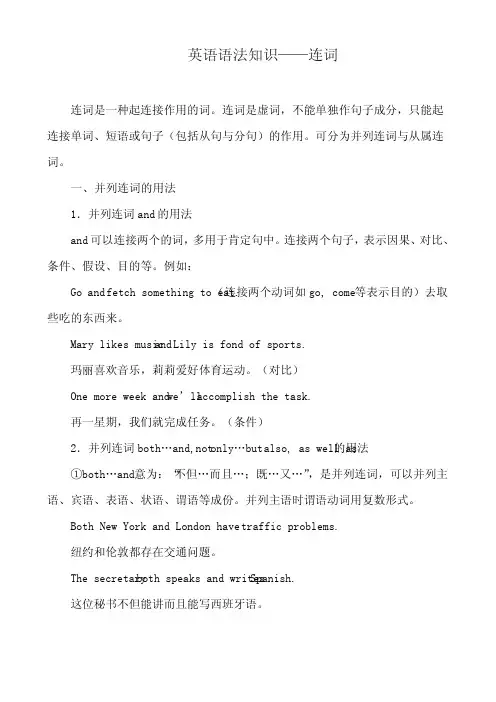
英语语法知识——连词连词是一种起连接作用的词。
连词是虚词,不能单独作句子成分,只能起连接单词、短语或句子(包括从句与分句)的作用。
可分为并列连词与从属连词。
一、并列连词的用法1.并列连词and的用法and可以连接两个的词,多用于肯定句中。
连接两个句子,表示因果、对比、条件、假设、目的等。
例如:(连接两个动词如go, come等表示目的)去取Go andfetch something to eat.些吃的东西来。
andLily is fond of sports.Mary likes music玛丽喜欢音乐,莉莉爱好体育运动。
(对比)One more week and we’ll accomplish the task.再一星期,我们就完成任务。
(条件)的用法2.并列连词both…and,not only…but also, as well as①both…and意为:“不但…而且…;既…又…”,是并列连词,可以并列主语、宾语、表语、状语、谓语等成份。
并列主语时谓语动词用复数形式。
Both New York and London have traffic problems.纽约和伦敦都存在交通问题。
Spanish.The secretaryboth speaks and writes这位秘书不但能讲而且能写西班牙语。
②not o nly…but also 意为:“不但...而且”,是并列连词,可以连接两个词,也可连接两个句子。
其中,but also 中的also可以省略。
not o nly…but also 可以连接句中所有的成份,连接并列主语时,其谓语动词根据就近原则,与所靠近的成分保持数的一致。
not o nly…but also 可以连接两个句子,not only 位于句首时, not only 后的句子要倒装。
Not only the students but (also) their teacher is enjoying the movie.不仅学生们津津有味地看着这部电影,而且他们的老师也是如此。
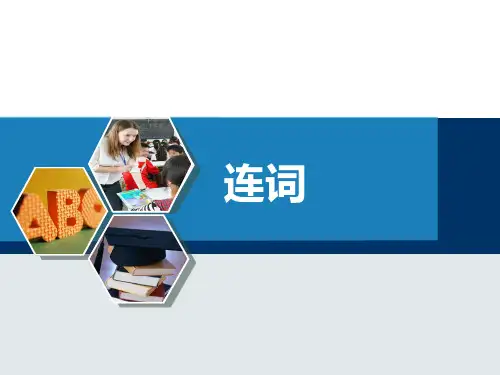

英语语法什么是连词连词在英语语法中扮演着非常重要的角色。
它们用于连接词、短语、句子和句子之间的关系,帮助我们组织思维和表达意思。
在本篇文章中,我将详细介绍连词的不同类型、用法和一些重要的注意事项。
一、连词的定义和分类连词是一类词性,用于连接词、短语、句子和句子之间的关系。
根据其功能和用法,连词可分为以下几类:1. 并列连词(Coordinating Conjunctions):用于连接同等重要的词、短语、句子或句子之间的关系。
常见的并列连词有"and"、"but"、"or"、"nor"、"for"、"yet"等。
2. 从属连词(Subordinating Conjunctions):用于引导从属从句,并将从属从句与主句连接起来。
从属连词在句子中起到连接主从句的作用。
常见的从属连词有"although"、"because"、"if"、"when"、"while"等。
3. 连接副词(Correlative Conjunctions):由两个或多个词组成,用于连接相同类型的词、短语或句子。
常见的连接副词有"either...or"、"neither...nor"、"both...and"、"not only...but also"等。
4. 连接代词(Relative Pronouns):既是代词,又是连词,引导定语从句,并将定语从句与主句连接起来。
常见的连接代词有"who"、"whom"、"whose"、"which"、"that"等。
高中英语语法连词一.概念连词是用来连接词,短语,从句或句子的词.连词不作成分.二.相关知识点精讲1.表示并列关系的连词有:and, both…and…,not only… but also…和neither…nor…等1)and:和,并且A:基本用法:“and”表示“和”、“并且”的意思,用来连接对等关系的字和字,片语和片语,句子和句子。
I enjoy basketball , football and table tennis.The weather becomes colder and colder.B:特别用法:祁使句后连接and,有条件句作用,此时and=if you…,you’ll…Go straight on, and you’ll see the library.==If you go straight on, you will see the library.2)both…and…既…也…,(两者)都…A、both…and…构成的词组作主语时,谓语动词用复数。
Both Jim and Kate are from England.B、both…and…否定句表示部分否定。
You can’t speak both German and English.Both my father and my mother aren’t doctors.3)neither…nor…:既不…也不…neither…nor…连接两个并列主语时,谓语动词靠近哪个主语就与哪个主语保持“人称”和“数”的一致,即采取就近原则。
Neither I nor he has seen the play before.4)not only…but also…:不但…而且…no t only…but also…连接两个主语后的谓语动词也遵循就近原则。
Not only the mother but also the children are ill. 2.表示转折关系的连词有:but, however, yet, still,while 等。
初中英语语法连词初中英语语法-连词一、概说连词是一种虚词,用于连接单词、短语、从句或句子,在句子中不单独用作句子成分。
连词按其性质可分为并列连词和从属连词。
并列连词用于连接并列的单词、短语、从句或句子,如and, but, or, for等;从属连词主要引出名词性从句(主语从句、宾语从句、表语从句等)和状语从句(时间状语从句、条件状语从句、目的状语从句等),引出名词性从句的连词如that,whether等,引出状语从句的连词如when, because,since, if 等。
二、并列连词的用法1. 表示转折关系的并列连词。
这类连词主要有 but, yet 等。
Someone borrowed my pen, but I don't remember who.有人借了我的钢笔,但我不记得是谁了。
He said he was our friend, yet he wouldn't help us.他说他是我们的朋友,但却不肯帮助我们。
2. 表示因果关系的并列连词。
这类连词主要有 for, so 等。
The child had a bad cough, so his mother took him to the doctor.这孩子咳得很利害,所以他妈妈带他去看医生。
You are supposed to get rid of carelessness, for it often leads to serious errors.你们一定要克服粗枝大叶,因为粗枝大叶常常引起严重的错误。
注意:for表示结果通常不能放句首,也不能单独使用。
3. 表示并列关系的并列连词。
这类连词主要有and , or , either…or , neither…nor , not only…but (also) ,both…and , as well as 等。
He didn't go and she didn't go either.他没去,她也没去。
连词§1.并列连词§2.从属连词连词是连接字、短语、从句与句子的词,是虚词,因此它不能独立担任句子成分。
连词主要分为两大类:并列连词和从属连词。
并列连词用来连接并列关系的词、词组或分句。
它包括:and,or,but,so,for,both…and,either…or,neither…nor,not only…but also。
从属连词用来引导从句,它包括:that,when,till,until,after,before,since,because,if,whether,though,although,so…that,so that,in order that,as soon as,as…as can…下面,我们分别讲述主要连词的用法。
并列连词1 and:和,并且I like basketball,football and table-tennis.我喜欢篮球、足球和乒乓球。
1.基本用法and表示“和”、“而且”的意思,用来连接对等关系的字和字,片语与片语,句子与句子。
He got up and put on his hat.他站起来,戴上了帽子。
I went to the Summer Palace and he went to Bei Hai Park.我去颐和园,他去北海公园。
单词或词组如果是三个以上连接,一般在最后的单词或词组前加and。
另外“and”在译成中文时不一定要翻译出“和”来。
2.特别用法:and在祈使句中的作用句型:祈使句,?and…=If you…,you'll…Use your head,and you'll find a way.动动脑筋,你就会想出办法来。
=If you use your head,you'll find a way.如果你动动脑子,你就会想出办法。
Hurry up,and you'll catch the bus.快点,你就会赶上公共汽车。
=If you hurry up,you'll catch the bus.如果你快点,你就会赶上公共汽车。
2 or:或,或者,否则Is Li Ming from Beijing or from Shanghai.李明是北京人还是上海人呢?1.基本用法or表示“~或”的意思,使用于两者之中选择一个的时候。
Would you like coffee or tea?你喜欢咖啡还是茶?Tom or I am right.我或者汤姆是对的。
Li Ming or his classmates are cleaning the room.李明或者是他的同班同学在打扫房间。
“A or B”作主语时,谓语动词随or后面的词(B)而定,因此例子中的谓语动词服从I,用am。
2.特别用法句型:祈使句,or…=If you don't…,you'll…同and一样,or在祈使句中的用法,译成“请…,否则…”,有转折的意思。
Hurry up,or you'll miss the bus.快点吧,否则你就会误了公共汽车。
=If you don't hurry up,you'll miss the bus.如果你不快点,你就会误了这班车。
Study hard,or you'll fail in the exam.好好学吧,否则你考试就会不及格。
=If you don't study hard,you'll fail in the exam.如果你不努力学习,你考试就会不及格。
注意or疑问句的读法or前面的部分用升调,后面的部分用降调。
3 but:但是,可是,而He is old,but he looks very young.他老了,但他看起来很年轻。
Li Li likes violin but doesn't like piano.李莉喜欢小提琴,(但是)不喜欢钢琴。
(but 后面省略了主语Li Li,因为与前面的主语成分相同)Mary likes violin,but Tom doesn't.玛丽喜欢小提琴,而汤姆不喜欢。
(doesn't后面省略了like violin,因为与前面的成分相同)He isn't a teacher but a doctor.他不是(一个)老师,而是医生。
They came here not for money but for the life.他们到这儿来,不是要钱,而是要命。
注意but所连接的句子,句中如果某些成分与前面相同,则可以省略。
4 so,forIt began to rain,so we had to stay here.开始下雨了,我们不得不呆在这儿了。
1.so:所以,因此,于是My teacher asked me to go,so I went.我们老师让我去,因此我就去了。
比较so除了作连词外,也可以作副词。
I hope you can pass the exam.我希望你能通过考试。
I hope so.我也希望。
Don't walk so fast.别走得太快。
2.for:因为I soon went to sleep,for I was tired.我很快就入睡了,因为我太累了。
The sun has risen,for the birds are singing.太阳升起来了,小鸟在唱歌。
比较for和be cause for也可译为“因为”,但是它没有什么因果关系,不像because 那样,而for只是说明解释而已。
5 both…and:和,既……也……He can play both the violin and the piano.他既会拉小提琴,又会弹钢琴。
1.《both…and…》构成的词组作为主语时,谓语动词用复数。
Both Li Ming and Li Li are good students.(Li Ming和Li Li都是人,所以两者对等)李明和李莉都是好学生。
注意在《bo th…and…》句型中,and连接的词或词组要对等。
2.《both…and》的否定句表示部分否定。
He can't play both the violin and the piano.他会拉小提琴或者会弹钢琴。
(不全会)Both Li Ming and Li Li are not good students.明和李莉不都是好学生。
(其中一个是好学生)6 either…or,neither…norI want to visit either Tianjing or Shanghai.我想参观天津或者上海。
I like neither English nor Chinese.中文和英文我全不喜欢。
1.either…or:或……或……;不是……就是……a.《either…or…》构成的词组作为主语时,谓语动词随其邻近的词,即or后面的词而定。
Either you or he is right.不是你,就是他是对的。
b.此句型的否定句是全否定。
Either you or he isn't right.你和他都不对。
I don't want to visit either Tianjing orShanghai.天津和上海我都不想参观。
2.neither…nor:既不……也不……a.当此词组担任主语时,谓语动词的用法和either…or的用法一样,由nor后面的词而定。
Neither you nor I am right.你和我都不对。
b.此句型本身是全否定,因此不能再用否定式,即不能再加not。
(×)Neither You nor I am not right.比较both …and ,either…or ,neither …nor 这三个句型的相互关系如下:1.肯定句:I like both A and?B.我喜欢A和B。
I like both coffee and tea.我喜欢咖啡和茶。
(茶和咖啡我都喜欢)2.否定句:I don't like both A and B. =I like either A or B.我不喜欢A 或B。
I like either coffee or tea .咖啡和茶,我喜欢一样儿。
=I don't like both coffee and tea .3.I don't like either A or B .=I like neither A nor B.A和B 我都不喜欢。
咖啡和茶,我都不喜欢。
I like neither coffee nor tea .I don't like either coffee or tea .7 not only… but also:不但……而且(1)Not only you but also your father is coming.不但你,而且你父亲也要来。
(2)Jane is?not only beautiful?but also kind.珍妮不但漂亮,而且人非常好。
1.基本用法:《not only…but also》担任主语时,此句型的谓语动词随but also 后面的部分而定,参见上文例(1)。
另外not only…but also连接对等的词或词组;例(1)you(你)和your?father (你父亲)都是人。
例(2)beautiful(美的)和kind(亲切、慈祥)都是形容词。
2.该句型可以和“as well as”互换,但注意汉语翻译。
Your father as well as you is coming.不但你,而且你父亲也要来。
注意as well as的句子谓语动词随它前面的词“Your father”而定,所以用is coming.Jane is kind as well as beautiful.珍妮不但漂亮,而且为人很好。
从属连词1 thatI?think(that)he likes football.我想他喜欢足球。
that引导名词性从句(主语从句、表语从句、宾语从句和同位语从句)和定语从句,本书只介绍宾语从句。
1.that在宾语从句、间接引语中可以省略,主句与从句时态一致。
I think(that)he is tired.我想他累了。
I thought(that)he was tired.注意要特别注意主句与从句时态的呼应。
如果主句是过去时,从句一律改为过去的时态,详见第二十章宾语从句。
2.如果主句的动词是think,believe…;如果主句的主语是第一人称,变为否定句时,要否定主句,译成中文时,则否定从句。